Items filtered by date: December 2016
Causes of Burning Feet
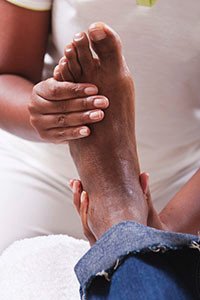 If you have a burning sensation in your feet, you may have any number of conditions. The feeling of burning in the feet can be either minor or severe, generally affect people over 50, and occur most frequently during the night. Nerve damage from diabetes, vitamin deficiency or alcoholism, obesity, strain on the feet, overheated feet, eczema or dermatitis, blood disorders, or any impairment of the feet’s nerves can all lead to the burning sensation. Seeing your podiatrist is vital to understanding any underlying causes. As always, make sure you are wearing properly fitting shoes as well.
If you have a burning sensation in your feet, you may have any number of conditions. The feeling of burning in the feet can be either minor or severe, generally affect people over 50, and occur most frequently during the night. Nerve damage from diabetes, vitamin deficiency or alcoholism, obesity, strain on the feet, overheated feet, eczema or dermatitis, blood disorders, or any impairment of the feet’s nerves can all lead to the burning sensation. Seeing your podiatrist is vital to understanding any underlying causes. As always, make sure you are wearing properly fitting shoes as well.
When dealing with systemic disease of the feet, it is extremely important to check the affected areas routinely so that any additional problems are caught quickly. If you have any concerns about your feet and ankles contact our podiatrist from Warren-Watchung Podiatry Center. Our doctor will assist you with all of your podiatric needs.
Systemic Diseases of the Feet
Systemic diseases affect the whole body, and symptoms usually are displayed in the feet. This condition can make a patient’s ability to walk unbearable. Systemic diseases include gout, diabetes mellitus, neurological disorders, and arthritis.
Gout – is caused by an excess of uric acid in the body. Common symptoms include pain, inflammation, and redness at the metatarsal/phalangeal joint of the base big toe. Gout can be treated by NSAIDs to relieve pain and inflammation, and other drugs that lower the acid levels in the body.
Diabetes mellitus – is an increase in the level of blood sugar that the body cannot counteract with its own insulin. Failure to produce enough insulin is a factor in Diabetes.
Diabetes of the Feet
Diabetic Neuropathy – may lead to damaged nerves and affect the feet through numbness and loss of sensation.
Peripheral Vascular Disease – can restrict the blood flow to the feet, and often times lead to amputation of the feet.
If you have any questions please feel free to contact our office located in Watchung and Marlboro, NJ. We offer the newest diagnostic and treatment technologies for all your foot and ankle needs.
Athlete's Foot
Athlete’s foot is an extremely contagious infection caused by a fungus that results in itching, burning, dry, and flaking feet. The fungus that causes athlete’s foot is known as tinea pedis and thrives in moist, dark areas such as shower floors, gyms, socks and shoes, commons areas, public changing areas, bathrooms, dormitory style houses, locker rooms, and public swimming pools. Athlete’s foot is difficult to treat as well because of the highly contagious and recurrent nature of the fungus.
Tinea is the same fungus that causes ringworm, and is spread by direct contact with an infected body part, contaminated clothing, or by touching other objects and body parts that have been exposed to the fungus. Because the feet are an ideal place for tinea to grow and spread, this is the most commonly affected area. It is, however, known to grow in other places. The term athlete’s foot describes tinea that grows strictly on the feet.
The most commonly infected body parts are the hands, groin, and scalp, as well as the feet. Around 70% of the population suffer from tinea infections at some point in their lives, however not all of these cases are athlete’s foot. Just like any other ailment, some people are more likely to get it than others, such as people with a history of tinea infections or other skin infections, both recurring and non-recurring ones. The extent to which a person experiences regrowth and recurrent tinea infections varies from person to person.
Sometimes people will not even know that they are infected with tinea or that they have athlete’s foot because of a lack of symptoms. However, most experience mild to moderate flaking, itching, redness, and burning. However, some of the more severe symptoms include cracking and bleeding skin, intense itching and burning, pain while walking or standing, and even blistering.
Because of the recurring nature of the tinea fungus and the athlete’s foot it causes, the best way to treat this condition is with prevention. You can take some preventative measures such as wearing flip flops or sandals in locker rooms and public showers to reduce contact with the floor. It also helps to keep clean, dry feet while allowing them to breathe. Using powders to keep your feet dry is a good idea, as well as keeping your feet exposed to light and cool air, to prevent the growth of tinea. If you do happen to get athlete’s foot, opt for using topical medicated creams, ointments or sprays. These treatments help eliminate and prevent it from coming back.
Athletes at High Risk for Contracting Tinea Pedis
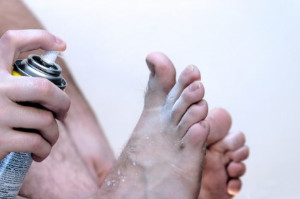 It certainly is no misnomer that one of the most prominent fungal infections, tinea pedis, is called athlete’s foot. Both professional and recreational athletes most likely have suffered from this irritating condition. If your foot is red, itching, or burning, particularly between the toes, be advised that these are the chief symptoms of athlete’s foot. Antifungal powders and sprays can be used to cure the condition in most cases. In order to avoid contracting athlete’s foot, make sure to keep your feet dry, change your socks if they get wet or dirty, and wear sandals or flip-flops in any public wet area. Whether you play sports, exercise, or just walk around, make sure you take steps to keep your feet covered, clean, and fungus-free.
It certainly is no misnomer that one of the most prominent fungal infections, tinea pedis, is called athlete’s foot. Both professional and recreational athletes most likely have suffered from this irritating condition. If your foot is red, itching, or burning, particularly between the toes, be advised that these are the chief symptoms of athlete’s foot. Antifungal powders and sprays can be used to cure the condition in most cases. In order to avoid contracting athlete’s foot, make sure to keep your feet dry, change your socks if they get wet or dirty, and wear sandals or flip-flops in any public wet area. Whether you play sports, exercise, or just walk around, make sure you take steps to keep your feet covered, clean, and fungus-free.
Athlete’s foot is an inconvenient condition that can be easily reduced with the proper treatment. If you have any concerns about your feet and ankles, contact Dr. Ronald Sheppard from Warren-Watchung Podiatry Center. Our doctor will treat your foot and ankle needs.
Athlete’s Foot: The Sole Story
Athlete's foot, also known as tinea pedis, can be an extremely contagious foot infection. It is commonly contracted in public changing areas and bathrooms, dormitory style living quarters, around locker rooms and public swimming pools, or anywhere your feet often come into contact with other people.
Solutions to Combat Athlete’s Foot
- Hydrate your feet by using lotion
- Exfoliate
- Buff off nails
- Use of anti-fungal products
- Examine your feet and visit your doctor if any suspicious blisters or cuts develop
Athlete’s foot can cause many irritating symptoms such as dry and flaking skin, itching, and redness. Some more severe symptoms can include bleeding and cracked skin, intense itching and burning, and even pain when walking. In the worst cases, Athlete’s foot can cause blistering as well. Speak to your podiatrist for a better understanding of the different causes of Athlete’s foot, as well as help in determining which treatment options are best for you.
If you have any questions please feel free to contact our office located in Watchung and Marlboro, NJ. We offer the newest diagnostic and treatment technologies for all your foot and ankle needs.
How to Care for Diabetic Foot
Millions of people are affected by diabetes each year. Diabetes damages blood vessels in all parts of the body, especially the feet. The legs and feet may develop slow blood flow, which causes neuropathy, or nerve damage. Once a diabetic patient develops neuropathy, it is important that the feet are well taken care of. Otherwise, the lower limbs may have to be amputated. This only happens in drastic cases, but it shows how seriously diabetic foot care should be taken.
It is very important to always wash and dry the feet thoroughly, especially in between the toes, if you’re a diabetic. Secondly, examining your feet and toes for redness or sores must be done, even if you do not feel pain. You may also want to examine your feet from the bottom. Try to avoid wearing colored socks to prevent infections that may occur from the dye. Well-fitting socks are also highly recommended.
A diabetic’s physician should always monitor their blood levels to test how well blood sugars are being maintained. In addition to giving advice about everyday eating habits and foot care, a physician may prescribe medicine to help with the diabetic patient’s neuropathy. It is also advised to see a podiatrist if experiencing any feet conditions. Toenails may also need to be taken care of by a podiatrist. This prevents patients from cutting too deeply around their cuticles, which can lead to infection.
A person can take care of their feet at home by following the instructions of their physician. Using creams on one’s feet is also an effective way to heal dryness. Proceed with caution when using tools to remove calluses, as severe diabetics may not be able to feel pain on their feet. If any complications arise do not hesitate to contact a podiatrist.
On a daily basis, diabetic feet must be checked. If you are ever concerned about something, contact your health care professional. You never want to wait until a wound becomes too severe to treat. If left untreated, gangrene may develop. Gangrene is a serious infection that can lead to sepsis or amputation. It is also important for diabetics to be on the lookout for ulcers. Ulcers are sores that develop from tissue loss on the skin. They can be quite painful and require intensive treatment. Early treatment and everyday inspection are imperative to staying healthy.
The Importance of Diabetic Foot Care
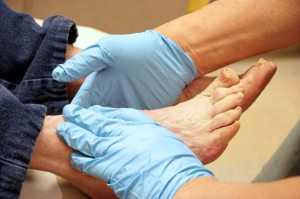 For those who have diabetes, it’s important to remember how vital it is to take proper care of your feet. Diabetes can lead to long-term foot problems if the feet are not constantly monitored and managed. Avoid using temperature-controlled items such as heating pads or electric blankets, as diabetic feet are prone to a loss of feeling, or neuropathy and can be easily burned. Avoid picking at corns, calluses, or ingrown toenails without professional supervision. Always wear shoes and avoid walking barefoot. Do routine checks of your feet, maintain proper hygiene, and do foot exercises to encourage blood circulation. Be sure to watch your diet to maintain healthy blood sugar levels, and visit your podiatrist often for check-ups.
For those who have diabetes, it’s important to remember how vital it is to take proper care of your feet. Diabetes can lead to long-term foot problems if the feet are not constantly monitored and managed. Avoid using temperature-controlled items such as heating pads or electric blankets, as diabetic feet are prone to a loss of feeling, or neuropathy and can be easily burned. Avoid picking at corns, calluses, or ingrown toenails without professional supervision. Always wear shoes and avoid walking barefoot. Do routine checks of your feet, maintain proper hygiene, and do foot exercises to encourage blood circulation. Be sure to watch your diet to maintain healthy blood sugar levels, and visit your podiatrist often for check-ups.
Diabetic foot care is important in preventing foot ailments such as ulcers. If you are suffering from diabetes or have any other concerns about your feet, contact Dr. Ronald Sheppard from Warren-Watchung Podiatry Center. Our doctor can provide the care you need to keep you pain-free and on your feet.
Diabetic Foot Care
Diabetes affects millions of people every year. The condition can damage blood vessels in many parts of the body, especially the feet. Because of this, taking care of your feet is essential if you have diabetes, and having a podiatrist help monitor your foot health is highly recommended.
The Importance of Caring for Your Feet
- Routinely inspect your feet for bruises or sores.
- Wear socks that fit your feet comfortably.
- Wear comfortable shoes that provide adequate support.
Patients with diabetes should have their doctor monitor their blood levels, as blood sugar levels play such a huge role in diabetic care. Monitoring these levels on a regular basis is highly advised.
It is always best to inform your healthcare professional of any concerns you may have regarding your feet, especially for diabetic patients. Early treatment and routine foot examinations are keys to maintaining proper health, especially because severe complications can arise if proper treatment is not applied.
If you have any questions please feel free to contact one of our offices located in Marlboro and Watchung, NJ . We offer the newest diagnostic and treatment technologies for all your foot and ankle needs.
How to Care for Diabetic Foot
Millions of people are affected by diabetes each year. Diabetes damages blood vessels in all parts of the body, especially the feet. The legs and feet may develop slow blood flow, which causes neuropathy, or nerve damage. Once a diabetic patient develops neuropathy, it is important that the feet are well taken care of. Otherwise, the lower limbs may have to be amputated. This only happens in drastic cases, but it shows how seriously diabetic foot care should be taken.
It is very important to always wash and dry the feet thoroughly, especially in between the toes, if you’re a diabetic. Secondly, examining your feet and toes for redness or sores must be done, even if you do not feel pain. You may also want to examine your feet from the bottom. Try to avoid wearing colored socks to prevent infections that may occur from the dye. Well-fitting socks are also highly recommended.
A diabetic’s physician should always monitor their blood levels to test how well blood sugars are being maintained. In addition to giving advice about everyday eating habits and foot care, a physician may prescribe medicine to help with the diabetic patient’s neuropathy. It is also advised to see a podiatrist if experiencing any feet conditions. Toenails may also need to be taken care of by a podiatrist. This prevents patients from cutting too deeply around their cuticles, which can lead to infection.
A person can take care of their feet at home by following the instructions of their physician. Using creams on one’s feet is also an effective way to heal dryness. Proceed with caution when using tools to remove calluses, as severe diabetics may not be able to feel pain on their feet. If any complications arise do not hesitate to contact a podiatrist.
On a daily basis, diabetic feet must be checked. If you are ever concerned about something, contact your health care professional. You never want to wait until a wound becomes too severe to treat. If left untreated, gangrene may develop. Gangrene is a serious infection that can lead to sepsis or amputation. It is also important for diabetics to be on the lookout for ulcers. Ulcers are sores that develop from tissue loss on the skin. They can be quite painful and require intensive treatment. Early treatment and everyday inspection are imperative to staying healthy.
What to Do to Keep Your Child’s Feet Healthy
Being a parent involves caring for your child in every way you can. You make sure they are eating the right food, being nice to others, and staying out of any trouble. However, it is also important that you are watchful of their health, more specifically their foot health. Maintaining good foot health in childhood is important in preventing later conditions in life from happening. As children continue to develop, their feet require different techniques of care. Here are some various ways in which you can help your child’s feet stay healthy.
A baby needs a lot of care and attention overall, but the importance of their feet should never be forgotten. Before a baby turns one, their feet change and develop greatly. It is important that during this time, a mother avoids putting tight socks on their child. She should also encourage movement of their feet so the baby can begin to feel more comfortable using them.
As a baby enters the toddler years of his or her life, they are begin to walk around. When your baby begins to take those first steps, it is crucial that they are wearing protective shoes on their feet. As a mother that is observant of your child’s feet, you may notice changes in them. This is completely normal as the feet are becoming susceptible to the activity of walking. It is normal for a toddler to be a bit unsteady or to “walk funny” at first.
When your child grows out of their toddler years, it is important that you begin to show him or her how to care for their feet on their own. Practice with your child proper hygiene in order to prevent foot fungus or infection. Since children are constantly on the move, it is crucial to be cautious of any accidents or injuries that might occur. If an injury occurs, it is advised that you take your child to be examined by a doctor immediately. Since your child is still growing, particular injuries can shift the way in which a bone or other important part of the foot is developing.
Babies and kids are always changing and growing. Your job as a parent is to make sure they stay healthy and making sure they are properly maintained. This involves proper foot care and making sure the feet stay healthy. Following this guide, your child can live a long and happy life.
Boots for Yoops Seeks to Collect Shoes for Children in Need
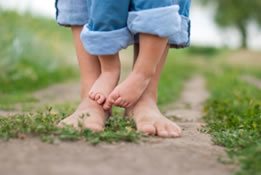 A new campaign launched by the Salvation Army is aiming to keep children’s feet warm and dry this winter season. The campaign, Boots for Yoops, is collecting boots, shoes, and socks for various children in need. Leonita Schweigert, the campaign’s creator, shared, “I decided instead of duplicating services and doing Coats for Kids like everybody does, that there are so many kids without proper shoes. To determine who exactly is in need of winter shoes, Schweigert contacted local schools to obtain names and sizes of children in need. New shoes and boots are being requested as to avoid potential health issues, such as Athlete’s foot. While the campaign was off to a slow start in December, Schweigert is hopeful it will amass enough for those in need once it completes its run through the end of February.
A new campaign launched by the Salvation Army is aiming to keep children’s feet warm and dry this winter season. The campaign, Boots for Yoops, is collecting boots, shoes, and socks for various children in need. Leonita Schweigert, the campaign’s creator, shared, “I decided instead of duplicating services and doing Coats for Kids like everybody does, that there are so many kids without proper shoes. To determine who exactly is in need of winter shoes, Schweigert contacted local schools to obtain names and sizes of children in need. New shoes and boots are being requested as to avoid potential health issues, such as Athlete’s foot. While the campaign was off to a slow start in December, Schweigert is hopeful it will amass enough for those in need once it completes its run through the end of February.
Making sure that your children maintain foot health is very important as they grow. If you have any questions, contact Dr. Ronald Sheppard from Warren-Watchung Podiatry Center. Our doctor can provide the care you need to keep you pain-free and on your feet.
Keeping Children's Feet Healthy
Having healthy feet in childhood can help prevent medical problems later in life, namely in the back and legs. As children grow, their feet require different types of care from birth to school-age.
Although babies do not walk yet, it is still very important to take care of their feet.
- Avoid putting tight shoes or socks on his or her feet
- Allow the baby to stretch and kick his or her feet to feel comfortable
As a toddler, kids are now on the move and begin to develop differently. At this age, toddlers are getting a feel for walking, so don’t be alarmed if your toddler is unsteady or ‘walks funny’.
As your child gets older, it is important to teach them how to take care of their feet
- Show them proper hygiene to prevent infections such as fungus
- Be watchful of any pain or injury
- Have all injuries checked by a doctor as soon as possible
- Comfortable, protective shoes should always be worn, especially at play
If you have any questions please feel free to contact our office located in Watchung and Marlboro, NJ. We offer the newest diagnostic and treatment technologies for all your foot and ankle needs.
Diabetic Foot Amputations
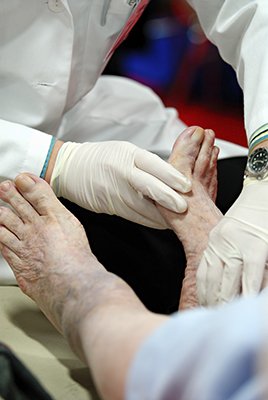 Diabetic foot care is something that should be taken very seriously, because numbness and loss of feeling is very common, due to the lack of circulation in the legs and feet. Treating these symptoms with haste could prevent the detection of problems such as ulcers. Ulcers, coupled with inordinately slow healing, can cause infections to persist, spread, and even lead to amputation. It is vital to make sure to look out for these symptoms, and you should see a doctor immediately if signs of sores, numbness, and loss of feeling occurs.
Diabetic foot care is something that should be taken very seriously, because numbness and loss of feeling is very common, due to the lack of circulation in the legs and feet. Treating these symptoms with haste could prevent the detection of problems such as ulcers. Ulcers, coupled with inordinately slow healing, can cause infections to persist, spread, and even lead to amputation. It is vital to make sure to look out for these symptoms, and you should see a doctor immediately if signs of sores, numbness, and loss of feeling occurs.
Diabetic foot care is important in preventing foot ailments such as ulcers. If you are suffering from diabetes or have any other concerns about your feet, contact Dr. Ronald Sheppard from Warren-Watchung Podiatry Center. Our doctor can provide the care you need to keep you pain-free and on your feet.
Diabetic Foot Care
Diabetes affects millions of people every year. Diabetes can damage blood vessels in many parts of the body, including the feet. Because of this, taking care of your feet is essential if you have diabetes, and having a podiatrist help monitor your foot health is highly recommended.
The Importance of Caring for Your Feet
- Routinely inspect your feet for bruises or sores.
- Wear socks that fit your feet comfortably.
- Wear comfortable shoes that provide adequate support.
Patients with diabetes should have their doctor monitor their blood levels because blood sugar levels play such a huge role in diabetic care. Monitoring these levels on a regular basis is highly advised.
It is always best to inform your healthcare professional of any concerns you may have regarding your feet, especially for diabetic patients. Early treatment and routine foot examinations are keys to maintaining proper health, especially because severe complications can arise if proper treatment is not applied.
If you have any questions please feel free to contact our office located in Watchung and Marlboro, NJ. We offer the newest diagnostic and treatment technologies for all your foot and ankle needs.
Virtual Reality Technology Helping Seniors
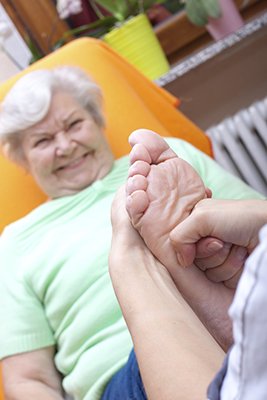 The use of technology has drastically transformed the way we do lots of things, particularly in the world of medicine. With a combination of virtual reality and treadmill training, an Israeli study shows that this may be an effective way to prevent dangerous falls associated with aging. Currently, this collaboration of virtual reality and treadmill techniques focuses on improving muscle strength, balance, and gait. The Israeli research team, in cooperation with partners across Europe, has found that physical mobility and cognition are important for safe walking. Participants reduced their risk of falling for at least six months post-training.
The use of technology has drastically transformed the way we do lots of things, particularly in the world of medicine. With a combination of virtual reality and treadmill training, an Israeli study shows that this may be an effective way to prevent dangerous falls associated with aging. Currently, this collaboration of virtual reality and treadmill techniques focuses on improving muscle strength, balance, and gait. The Israeli research team, in cooperation with partners across Europe, has found that physical mobility and cognition are important for safe walking. Participants reduced their risk of falling for at least six months post-training.
Proper foot care is something many older adults forget to consider. If you have any concerns about your feet and ankles, contact Dr. Ronald Sheppard from Warren-Watchung Podiatry Center. Our doctor can provide the care you need to keep you pain-free and on your feet.
The Elderly and their Feet
As we age we start to notice many changes in our body, but the elder population may not notice them right away. Medical conditions may prevent the elderly to take notice of their foot health right away. Poor vision is a lead contributor to not taking action for the elderly.
Common Conditions
Neuropathy – can reduce feeling in the feet, and can hide many life threating medical conditions.
Reduced flexibility – prevents the ability of proper toenail trimming, and foot cleaning. If left untreated, it may lead to further medical issues.
Foot sores – amongst the older population can be serious before they are discovered. Some of the problematic conditions they may face are:
Gouging toenails affecting nearby toe
Shoes that don’t fit properly
Pressure sores
Loss of circulation in legs & feet
Edema & swelling of feet and ankles
Susceptible Infections
Diabetes and poor circulation can cause general loss of sensitivity over the years, turning a simple cut into a serious issue.
If you have any questions please feel free to contact our office located in Watchung and Marlboro, NJ. We offer the newest diagnostic and treatment technologies for all your foot and ankle needs.
